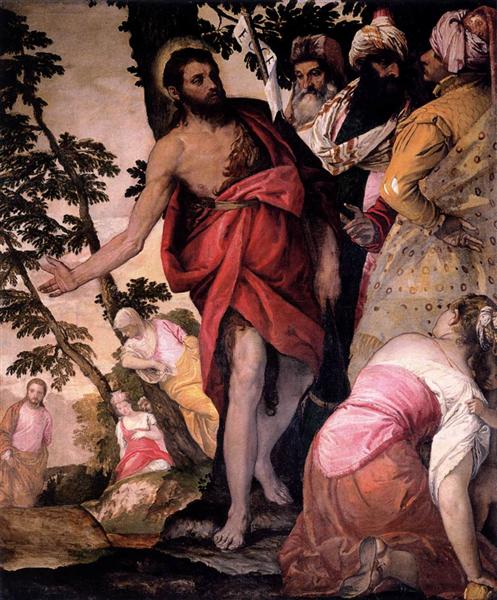Beschreibung
Das Gemälde "Die Predigt von San Juan Bautista" (1562) von Paolo Veronese ist ein Werk, das die Grandiosität und Komplexität der venezianischen Renaissance zusammenfasst. In diesem Stück entzieht sich Veronese von dem hermetischen und strengen Ansatz, der einige seiner Zeitgenossen charakterisiert und auf eine Explosion der Farbe und ein Gefühl von Bewegung und Theatralik wetten, der es bemerkenswert unterscheidet.
Bei der Beobachtung der Komposition wird eine lebendige Szene wahrgenommen, in der San Juan Bautista, der zentrale Protagonist, einen herausragenden Platz auf der linken Seite der Leinwand in einer unterstehenden Geste einnimmt, die die Aufmerksamkeit des Betrachters aufnimmt. Seine in Skins gekleidete Figur ruft den Propheten hervor, der in seiner göttlichen Mission Buße nennt. Die Verwendung von Licht unterstreicht sein ausdrucksstarkes Gesicht und seine Position, fast wie ein Sprecher in der Mitte einer Baugruppe, was die Idee einer leistungsstarken und transzendentalen Botschaft verstärkt.
Das in der Arbeit dargestellte Publikum verdient ebenfalls Aufmerksamkeit. Veronese zeigt eine Vielfalt von Charakteren, die durch ihre Haltungen und Looks mehrere Szenenlesungen anbieten. Die aufmerksamen Gesichter und die unterschiedlichen Einstellungen der Zuhörer deuten vor den Worten von San Juan auf eine Faszination und Unruhe hin. Die Einbeziehung von Figuren unterschiedlicher Altersgruppen und Rassen spiegelt das Interesse des Künstlers an der Menschheit in seiner gesamten Vielfalt wider, ein wiederkehrendes Thema in seiner Arbeit.
Die Farbe in dieser Arbeit ist nicht nur für ihren Reichtum bemerkenswert, sondern auch für seine Fähigkeit, Emotionen zu erzeugen. Die warmen und lebendigen Töne, die im Umkleideraum der Hörer vorherrschen, stehen im Gegensatz zu den irdischsten Farben der Figur des Heiligen, wodurch eine elektrifizierende Atmosphäre erzeugt wird, die den Himmelsbetrag mit dem Alltäglichen gegenüberstellt. Light Management - eine Master -Technik von Veronese - erleuchtet die Szene und betont die Bedeutung der spirituellen Botschaft und verleiht der visuellen Erzählung das Leben.
Die Kompositionsstruktur ist außerdem ein Beispiel für den Virtualismus von Veronesisch in der Organisation des Weltraums. Die Anordnung der Charaktere führt den Blick des Betrachters durch die Leinwand und ermöglicht es, jede Ecke der Farbe zu erkunden. Die Diagonale, die die Figur von San Juan zusammen mit dem Raum bildet, der sich für die Gruppe der Hörer öffnet, schafft nicht nur Tiefe, sondern auch eine Dynamik, die die Reflexion über die Wechselwirkung zwischen dem Prediger und seiner Gemeinde einlädt.
Obwohl San Juan de Veronese von früheren Traditionen inspiriert ist, zeigt er einen einzigartigen Stil, der der Geschichte eine neue Dimension verleiht. Ihre Gesten und Ausdrücke sind nicht nur beschreibend, sondern Dialog mit dem Betrachter, wodurch das Grad der emotionalen und spirituellen Verbindung erhöht wird. Die Predigt hier ist nicht nur ein Moment in der Geschichte, sondern auch eine Einladung zur Kontemplation und existenzielle Unsicherheit, universelle Themen, die im Laufe der Zeit schwingen.
Im breiteren Kontext der Renaissance ist Veronese's Arbeit parallel zu anderen Darstellungen religiöser Themen zu sehen, die durch einen üppigen Erzählung und visuellen Ansatz gekennzeichnet sind. Sein Einfluss fühlte sich nicht nur in Venedig, sondern in ganz Europa ein Erbe, das weiterhin im Barock erforschen würde.
"Die Predigt von San Juan Bautista" ist kurz gesagt ein Meisterwerk, das nicht nur das Genie von Paolo Veronese widerspiegelt, sondern auch ein Zeugnis der tiefen Interaktion zwischen Kunst, Religion und Menschlichkeit in der Renaissance ist. In diesem Stück verbinden sich die Farben, Formen und Figuren nicht nur die Geschichte eines Predigers, sondern auch die Essenz der spirituellen Suche, die in einem erhabenen Moment festgenommen wurde.
KUADROS ©, eine berühmte Farbe an Ihrer Wand.
Handgemachte Ölgemälde, mit der Qualität professioneller Künstler und dem unverwechselbaren Siegel von KUADROS ©.
Pictures Reproduction Service mit Zufriedenheitsgarantie. Wenn Sie mit der Nachbildung Ihres Gemäldes nicht vollständig zufrieden sind, erstatten wir Ihr Geld zu 100%.

